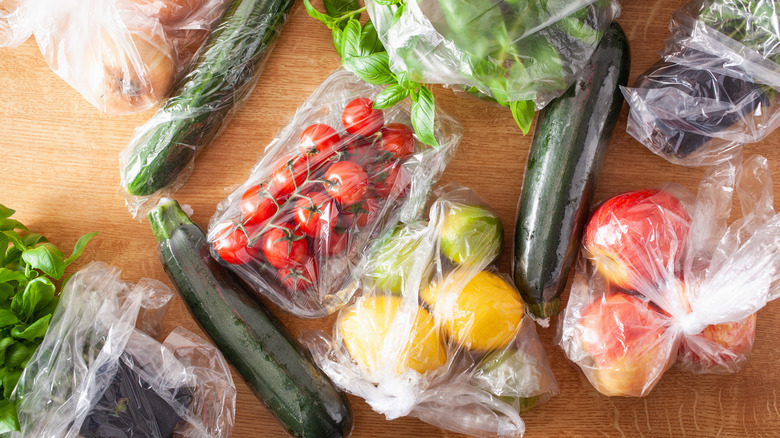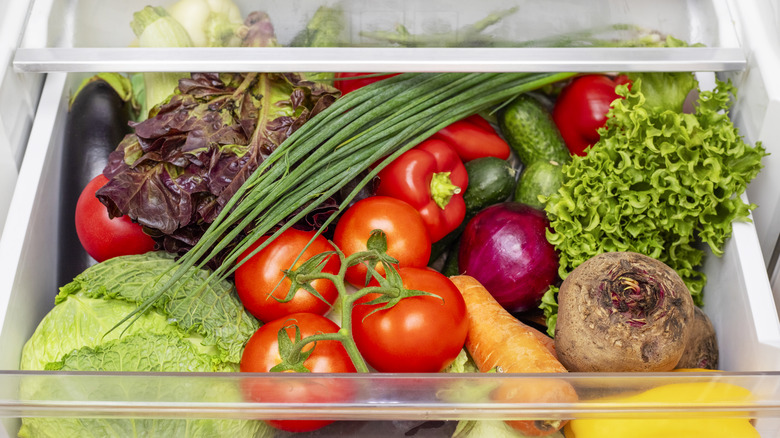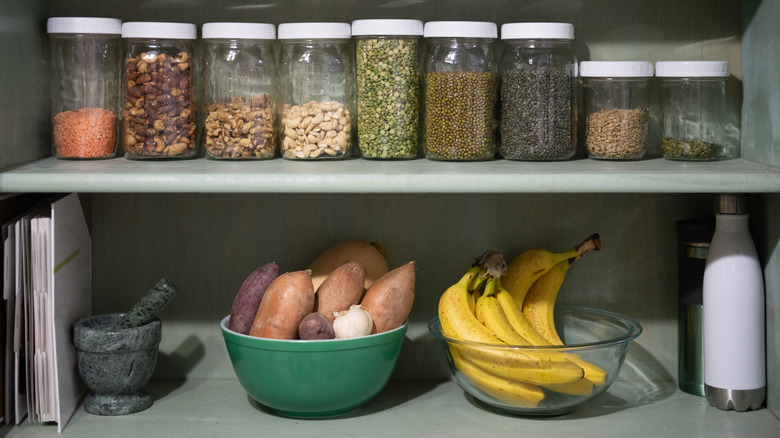The Problem With Storing Produce In The Plastic Bag They Came In
You make a grocery list and check it twice. You buy the loose organic spinach over the prepackaged kind because it's healthy and cheaper. You bag your own apples for the same reason. You put both in your refrigerator's produce bin and accidentally wait a week before making that spinach salad with grapes and bits of bacon. When you finally reach for the spinach, it's wilted and shriveled. A couple of days later, those bright and crisp fuji apples have spotted brown patches and turned mealy. How and why did your precious produce go bad? It's not you: It's probably just a careless storage mistake.
Plastic, especially in the culinary world, is ubiquitous. Just stroll down any aisle of the grocery store and you'll see every variety of single-use plastic imaginable. It's easily mass-produced and light, and besides, what would be the alternative? You're going to grab a wooden crate for those apples? Despite the use of plastic storage being nearly universal, those thin produce bags aren't designed as long-term storage solutions. They're actually a very poor way to keep food in your refrigerator because produce needs air circulation and varying degrees of humidity to stay fresh. If you remember middle school biology, you might already know why.
Plastic bags suffocate fruits and veggies
In a closed plastic bag with restricted airflow, produce will release moisture. This is especially true for fresh, unprocessed fruits and vegetables like delicate organic spinach. Think of carrots or peppers as water balloons. The more water inside, the more they expand and become rigid. Air and liquid naturally seek equilibrium because high density travels to low density due to osmosis. So, when moisture is locked in, the cells stay plump and tight; when gone, the cells shrink and shrivel. That water pressure within the fruit or vegetable is called turgor pressure, or turgidity, which maintains the produce's shape like a full water balloon. It's the same reason that cut flowers last longer in water and why grocery stores spray water on produce.
One way to lengthen the shelf life of refrigerated vegetables is to adjust the humidity in your crisper drawers. That little dial in your refrigerator you're not sure what to do with isn't for show: It controls the amount of moisture in the compartment. Raising the humidity causes a natural equilibrium of moisture; less water escapes, and the produce retains its shape while staying crisp and fresh. So, next time you bring home beautiful farmers' market greens or bundles of asparagus, keep them in a perforated container like a salad spinner rather than haphazardly stuffing the plastic bag into the produce drawer of your refrigerator. Reusable green bags, a dedicated lettuce keeper, and even paper towels will also do the trick.
Avoid plastic bags for pantry produce storage, too
A similar game of produce Tetris applies to the pantry, where produce including citrus, tomatoes, potatoes, cantaloupe, and, of course, garlic and onions, should not be stored. Some vegetables can overripen and rot quicker if stored with fruit. Hormonal changes in some produce, mostly fruits, release ethylene, a gas that accelerates ripening. You can imagine why plastic is such a bad storage device in this situation. If tomatoes are stored in a sealed bag, that ethylene has nowhere to go, creating a feedback loop that will quickly cause spoilage.
Because some foods are more vulnerable to ethylene than others, it's necessary to know what produce can be stored together. In short, a good way to stop ethylene producers from quickly ripening other items is by storing them in separate pantry compartments or in brown paper bags. This is an ideal environment for foods like citrus, onions, and garlic which are best kept cool and dry. You can use a hole puncher to turn paper bags into perforated long-term storage for these items and keep onions and garlic fresh for months. The biology behind ethylene can also work to your advantage if you need to ripen produce in a pinch by storing ethylene-sensitive vegetables with ethylene-producing produce. There's a whole host of benefits to upping your storage game and ditching plastic bags: Your greens last longer, your apples keep that satisfying crunch, and you'll waste less food, money, and frustration.


